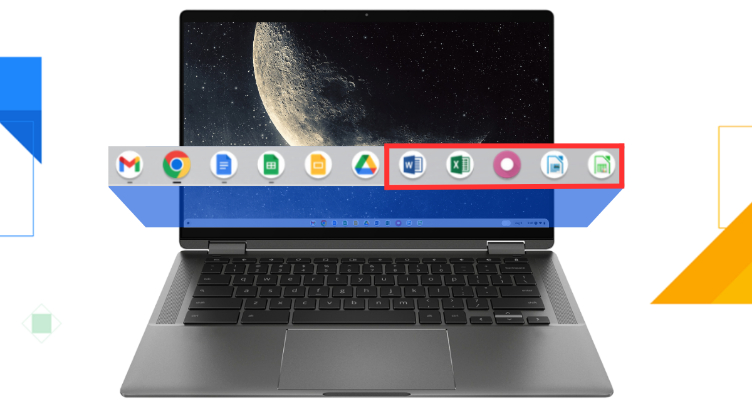Cameyo yesterday announced that its integration with ChromeOS now enables ChromeOS to provide Virtual App Delivery (VAD) services to organizations worldwide. The introduction of ChromeOS Virtual App Delivery with Cameyo gives organizations the ability to eliminate costly and insecure virtual desktops while still maintaining access to all of their applications. ChromeOS Virtual App Delivery with Cameyo helps organizations deliver any application - from SaaS to legacy apps - over the web, without the need for specific devices or virtual desktops to access them. Together, ChromeOS and Cameyo help organizations simplify application delivery, reduce their total cost of ownership by 54%* compared to virtual desktops, improve security, and deliver a better user experience.
This integration of ChromeOS and Cameyo enables organizations to easily bring all of their apps - including Windows, Linux, SaaS, and internal web apps - to the web, regardless of which cloud or on-prem data center they are hosted on. This enables them to eliminate the infrastructure and licensing complexity of delivering full virtual desktops to their users, all while maintaining seamless access to their apps.
After speaking with organizations that made the switch from traditional virtual desktops to Virtual App Delivery with ChromeOS and Cameyo, analyst firm Enterprise Strategy Group (ESG) released a recent Economic Validation study that found ChromeOS and Cameyo provide a 54% reduction in Total Cost of Ownership (TCO) compared to virtual desktops. That 54% reduction in TCO takes into consideration the following:
- 82% reduction in hardware costs - ESG confirmed the combination of savings related to ChromeOS IT costs and Cameyo infrastructure costs can save businesses 82% in total hardware costs.
- 75% reduction in licensing costs - ChromeOS Virtual App Delivery with Cameyo provides access to applications on a per-named-user basis, helping companies reduce their licensing and application costs by enabling each user to access their apps on any device, without needing a license for each device.
- 53% reduction in operational costs - ESG research found that ChromeOS and Cameyo deliver a 53% reduction in operational costs by eliminating many of the tasks typically required to operate a virtual desktop, such as configuring applications for each desktop, provisioning, patching, and updating those devices.
The integration of ChromeOS and Cameyo provides organizations with in-depth security across their devices, apps, data, and networks. ChromeOS devices have never had a reported ransomware attack, due to its multi-layered security approach that protects data and fights current and future security threats. And both ChromeOS and Cameyo are built with a Zero Trust security model that ensures apps and devices are isolated from network resources and segmented by default so that users only access the apps and data they need to get their jobs done, all while eliminating the need to expose firewall and server ports to the open internet.
While virtual desktops impede productivity by forcing users to switch between different environments to access their various apps, the integration of ChromeOS and Cameyo provides simple, unified access to all of an organization’s apps for a better end-user experience. To enable this native application experience for end users, Cameyo integrated with ChromeOS to enable the following:
- Progressive Web Apps (PWA) - With ChromeOS Virtual App Delivery with Cameyo, organizations can quickly and easily deliver any application as a PWA to ChromeOS devices via the Google Admin console with just a few clicks. This enables users to simply click on the app icon in their task bar to open the app just as if it were installed on the device.
- Native File System Integration - Through integration with ChromeOS File System Connector, Cameyo provides users with direct access to their local folders and files from within virtual apps.
- File Handling - Cameyo’s automatic file handling ensures that the correct virtual app launches based on the file type a user is trying to open in ChromeOS. Users can open their files in virtualized apps delivered by Cameyo in simple and familiar ways, with files opening in the right app simply by double-clicking.
- Clipboard Support - Through integration with ChromeOS Clipboard Connector, Cameyo is fully integrated with the local ChromeOS copy and paste functionality, bringing users familiar functionality that's cross-compatible across all application types.
* Source: (Economic Validation: Analyzing the Economic Benefits of ChromeOS and Cameyo, Enterprise Strategy Group (ESG), May 2023)
Naveen Viswanatha, Head of Product, ChromeOS Solutions at Google
While many organizations previously relied on virtual desktop solutions like VDI and DaaS to deliver their legacy software to end users, many are struggling with the significant overhead caused by delivering full virtual desktops. In today’s cloud-first world, users just need simple & secure access to their apps in a seamless way that optimizes their productivity. That’s where ChromeOS Virtual App Delivery with Cameyo comes in.
Andrew Miller, CEO of Cameyo
We’re ushering in a new era of computing that enables people to simply & securely access all of the apps they need to be productive without the cost, complexity, and security issues of virtual desktops. With the integration of ChromeOS and Cameyo, enterprises can eliminate the desktop and adopt modern, cloud-first computing while maintaining seamless access to all their apps.
Mario Zúñiga, IT Director, Digital Workplace at Sanmina
Deploying apps with ChromeOS and Cameyo is remarkably simple. Session management, load balancing, failover, etc. – it’s all handled by Cameyo, so all we had to focus on was the apps we wanted to publish. It was very easy to get set up, and ongoing management is a breeze – especially when compared to traditional virtual desktop approaches... One of the biggest draws of migrating to ChromeOS was its security. This integration, and the fact that Cameyo has a zero-trust security model baked in at its core, adds additional layers of security so that we can confidently enable our employees to work from anywhere, on any device, with the utmost security.






















